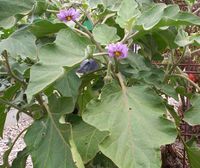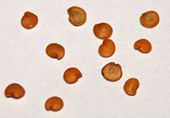Eggplant
The eggplant is a plant of the family Solanaceae (nightshades). The fruit is commonly used in cooking. As a nightshade, it is closely related to the tomato, potato and tobacco plant. It is native to India, where they have been cultivated for over 4,000 years.[1]
It is a perennial but is often cultivated as an annual. The fruit on wild plants is less than 3 cm (1.2 in) in diameter, but much larger in cultivated forms.
The fruit contains many small, soft and edible seeds, but have a bitter taste because they contain nicotinoid alkaloids, as the tobacco plant does.
Names
Scientific names: Solanum melongena
Common names: Aubergine, Melongene, Brinjal, Guinea squash
Scientific classification
Order: Solanales
Family: Solanaceae
Genus: Solanum
Species: S. melongena
Cultivation
Sow or pre-sow in the beginning of March. Sow and cultivate the young plants at a minimum temperature of 68 F (20 C). Keep the plants free from frost at all times. Plant from the end of April in the greenhouse or from half May outside on a warm spot. You can also grow eggplants in pots on a terrace or balcony.
Video
- Vegetable & Fruit Gardening : How to Grow Eggplant Eggplants are crops that hate the cold, so they should be planted in the spring after all danger of frost has passed - With Jarrett Man.
Uses
Medicinal uses
Eggplants are an appropriate food to improve circulation. It's useful to lower cholesterol and prevent arteriosclerosis. It also stimulates bile, which helps the liver to dissolve fats such as in cases of liver failure.
The paste from the crushed fruits has a soothing effect on burns, especially sunburns. Applied to painful areas of the body affected by rheumatic diseases, it has a soothing effect on pain.
It provides minerals such as phosphorus, iron, calcium, sodium and potassium.
In some areas the juice is taken to prevent growth of cancerous cells in the stomach.
As the plant belongs to the family Solanaceae, the use of the fresh juice and the leaves is dangerous. People with heart disease should refrain from its consumption by the stimulating effects exerted on the heart by solanine. Beware of plant raw eggplant and eggplant![2]
Recipes
On this page you find a list of eggplant recipes.
Gallery
See also
References
- ↑ http://www.botanical-online.com/english/propertiesofeggplants.htm Properties of eggplant - botanical-online.com
- ↑ http://www.botanical-online.com/english/propertiesofeggplants.htm Properties of eggplant - botanical-online.com
External links
- Eggplant Wikipedia
- Properties of eggplant Botanical-online.com



